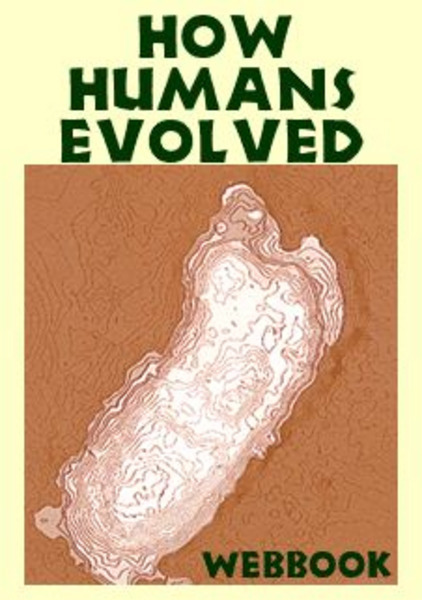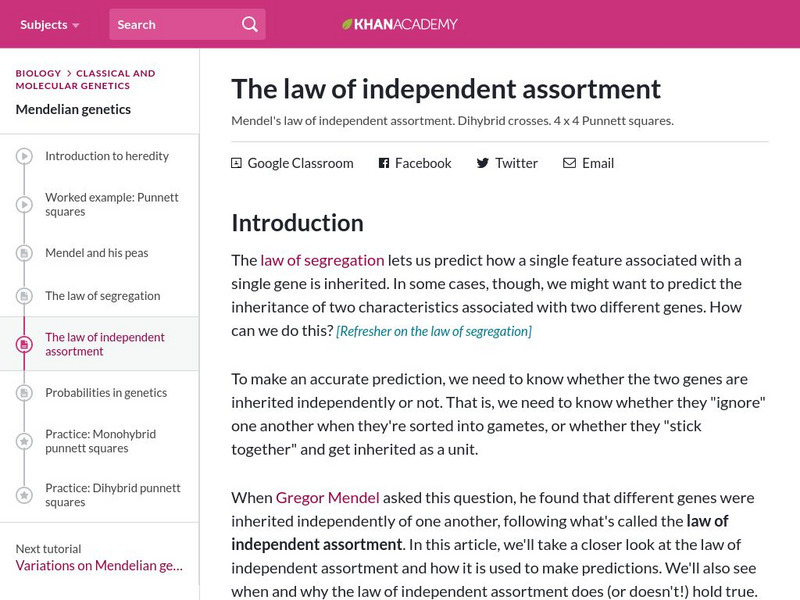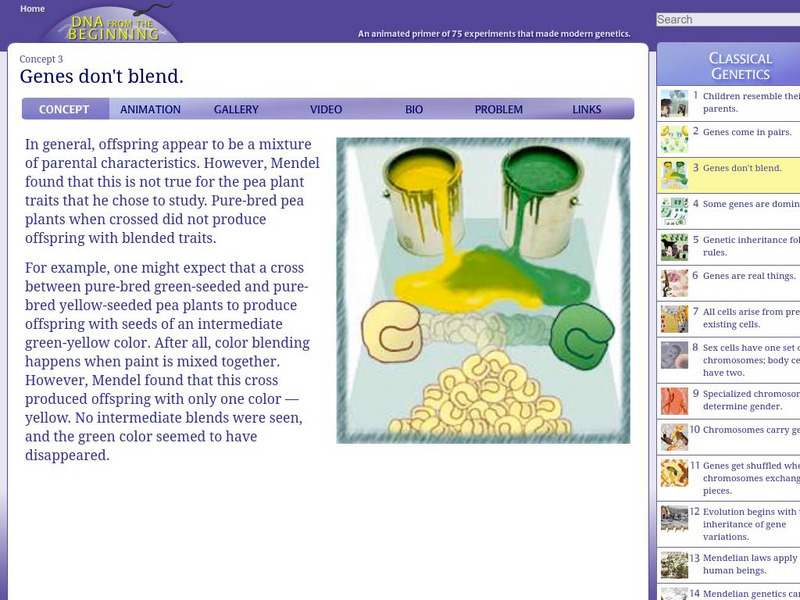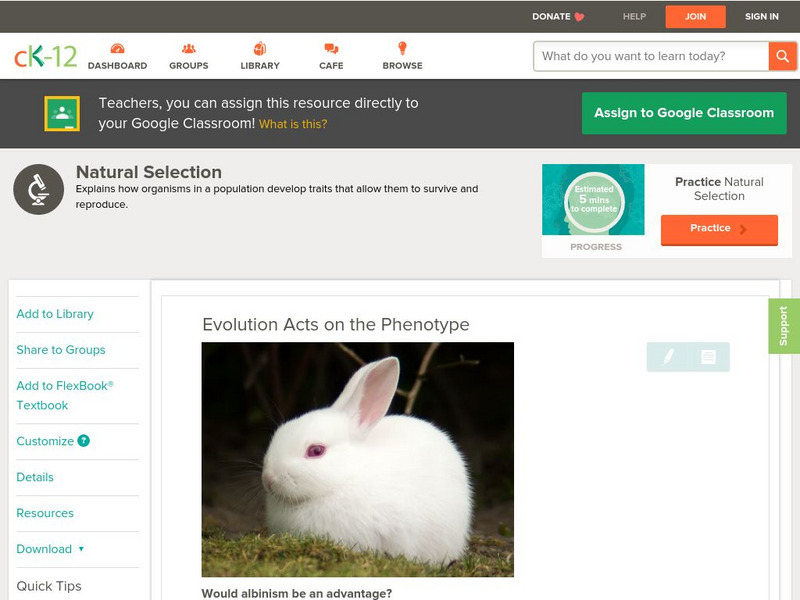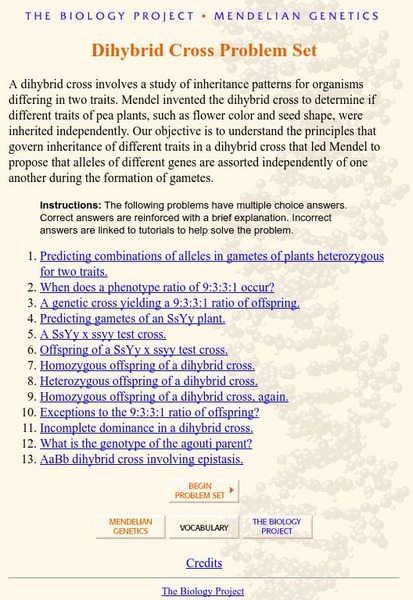CK-12 Foundation
Ck 12: Life Science: 3.1 Pea Plants
Understand why Gregor Mendel was the father of the field of genetics, which seeks to explain how traits are passed on from one generation to the next.
W. W. Norton
W. W. Norton & Company: How Humans Evolved
This provides access to a webbook about How Humans Evolved. The following topics are covered: (1) How Evolution Works, (2) Primate Behavior and Ecology, (3) The History of Human Lineage, and (4) Evolution and Modern Humans. Each chapter...
University of Maryland
Univ. Of Maryland Baltimore Cty/biology Century
Historical perspective on Mendel's contribution. Spends a little time setting up what the current beliefs of Mendel's day were and how he changed things with what he did.
Ducksters
Ducksters: Biology for Kids: Mendel and Inheritance
Explore how genes are passed from one generation to the next including Punnet squares. Kids learn about Gregor Mendel and his theories and experiments on inheritance and genetics.
Science Buddies
Science Buddies: Pedigree Analysis: A Family Tree of Traits
Some characteristics, like the shape of your hairline, whether your earlobes are attached or detached, and whether or not you have freckles are inherited from your parents. In this science project you will learn about Mendelian traits,...
Khan Academy
Khan Academy: The Law of Independent Assortment
Article defines Mendel's law of independent assortment, provides examples, and takes a look at how it is used to make predictions. Also, discusses dihybrid crosses and 4 x 4 Punnett squares.
Cold Spring Harbor Laboratory
Dna From the Beginning: Genes Don't Blend
Learn how Gregor Mendel's study of plants increased scientific knowledge regarding genetic traits.
National Institute of Educational Technologies and Teacher Training (Spain)
Ministerio De Educacion: La Base De La Herencia 2 Bachillerato
This unit discusses the following topics: cloning, transgenic, gene therapy, genetic code, human genome and DNA replication. It contains 19 interactive activities.
Cornell University
Cornell University: Cell Division: Genetic Consequences
Review, identify, and describe the important steps in the cell reproduction of whitefish, onion root, and lily anther, and quiz yourself on the similarities and differences between mitosis and meiosis. A "Cell Division Construction Kit"...
OpenStax
Open Stax: Anatomy & Physiology: Patterns of Inheritance
Students learn about patterns of inheritance including genotype and phenotype, and then learn about the inheritance of autosomal dominant and recessive and sex-linked genetic disorders.
PBS
Pbs Learning Media: Some Genes Are Dominant
This interactive activity, adapted from the Dolan DNA Learning Center, illustrates how Gregor Mendel used purebred yellow and green peas to show that some genes are dominant and others are recessive.
Curated OER
The Mendel Medal
An overview of the life of scientist Gregor Mendel discusses his early life as a professor, his experiements with genetics, his research in other scientific areas, and his later years.
Mocomi & Anibrain Digital Technologies
Mocomi: What Is Heredity?
Defines heredity, DNA, and chromosomes and discusses Gregor Mendel, the "father of genetics".
University of California
Cog Web: Can Matter Store Active Information?
This site provides a timeline of historical events in regards to discovery and research on genetics.
CK-12 Foundation
Ck 12: Life Science: Polygenic Traits
[Free Registration/Login may be required to access all resource tools.] Another exception to Mendel's rules is polygenic inheritance, which occurs when a trait is controlled by more than one gene. This means that each dominant allele...
Open Curriculum
Open Curriculum: Mendelian Inheritance
Students use this article to identify how probability is used to predict outcomes of genetic crosses.
CK-12 Foundation
Ck 12: Life Science: Pedigree Analysis
[Free Registration/Login may be required to access all resource tools.] A pedigree is a chart that shows the inheritance of a trait over several generations. A pedigree is commonly created for families, and it outlines the inheritance...
CK-12 Foundation
Ck 12: Life Science: Evolution Acts on the Phenotype
[Free Registration/Login may be required to access all resource tools.] Natural selection acts on the phenotype (traits or characteristics) of an individual. On the other hand, natural selection does not act on the underlying genotype...
CK-12 Foundation
Ck 12: Life Science: Non Mendelian Inheritance
[Free Registration/Login may be required to access all resource tools.] In all of Mendel's experiments, he worked with traits where a single gene controlled the trait. Each also had one allele that was always dominant over the recessive...
University of Arizona
University of Arizona: Dihybrid Problem Set
This site is provided by the University of Arizona and it gives great information on the subject. Good collection of dihybrid crosses which exemplify the issue of independent assortment. Work these once you think you've mastered th concept.
Sophia Learning
Sophia: Dihybrid Cross: Lesson 2
This lesson will explain how to use a Dihybrid cross when determining multiple genetic traits at once. It is 2 of 4 in the series titled "Dihybrid Cross."
Sophia Learning
Sophia: Dihybrid Cross: Lesson 3
This lesson will explain how to use a Dihybrid cross when determining multiple genetic traits at once. It is 3 of 4 in the series titled "Dihybrid Cross."
Sophia Learning
Sophia: Dihybrid Cross: Lesson 4
This lesson will explain how to use a Dihybrid cross when determining multiple genetic traits at once. It is 4 of 4 in the series titled "Dihybrid Cross."
Other popular searches
- Mendelian Genetics
- Mendel Genetics
- Mendelian Genetics Problems
- Mendel Genetics Review
- Mendelian Genetics Quiz
- Mendel Genetics Practice
- Mendel Genetics Concept Map
- Non Mendelian Genetics
- Mendel Genetics Create
- Mendelian Genetics Parents
- Mendelian Genetics Games
- Mendelian Genetics and Peas



